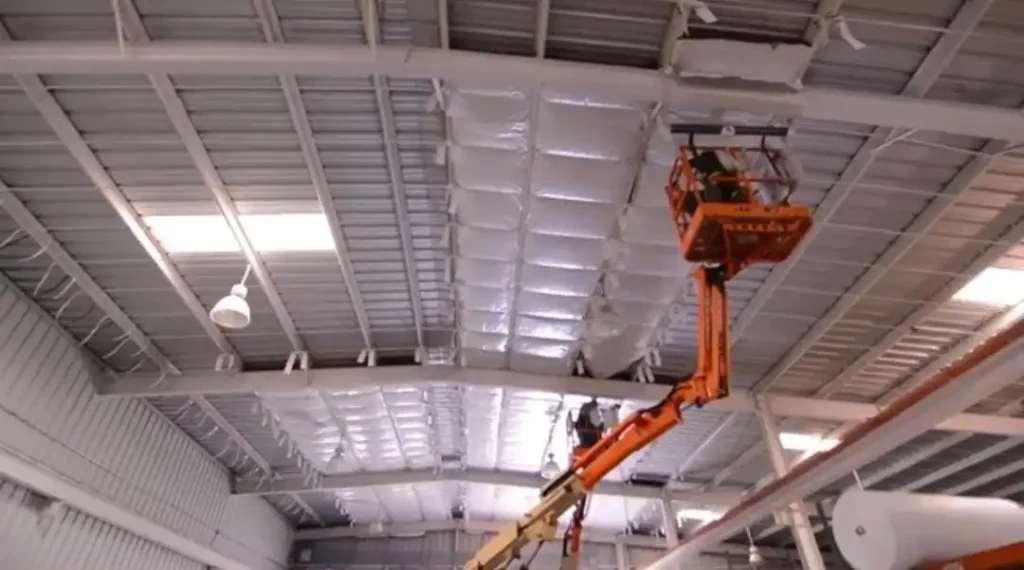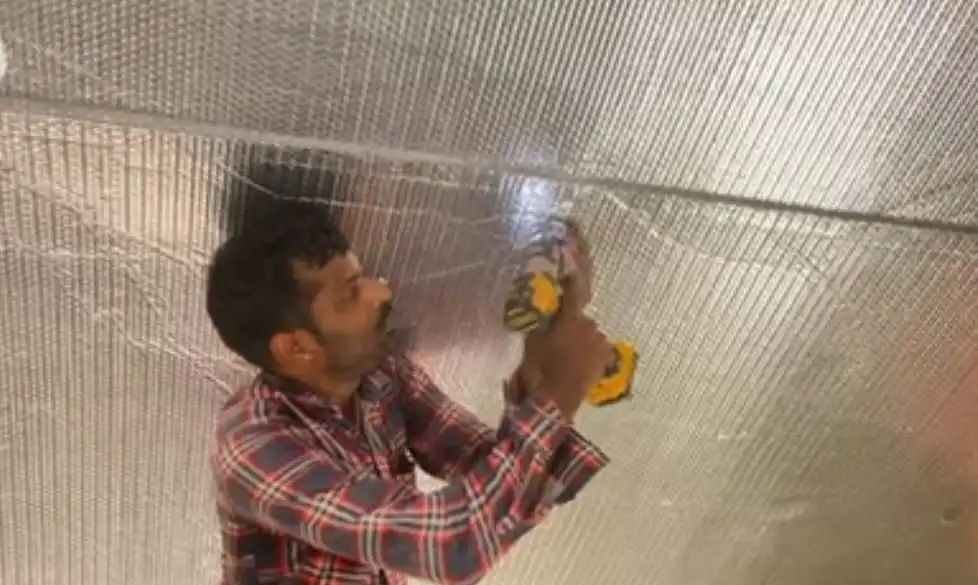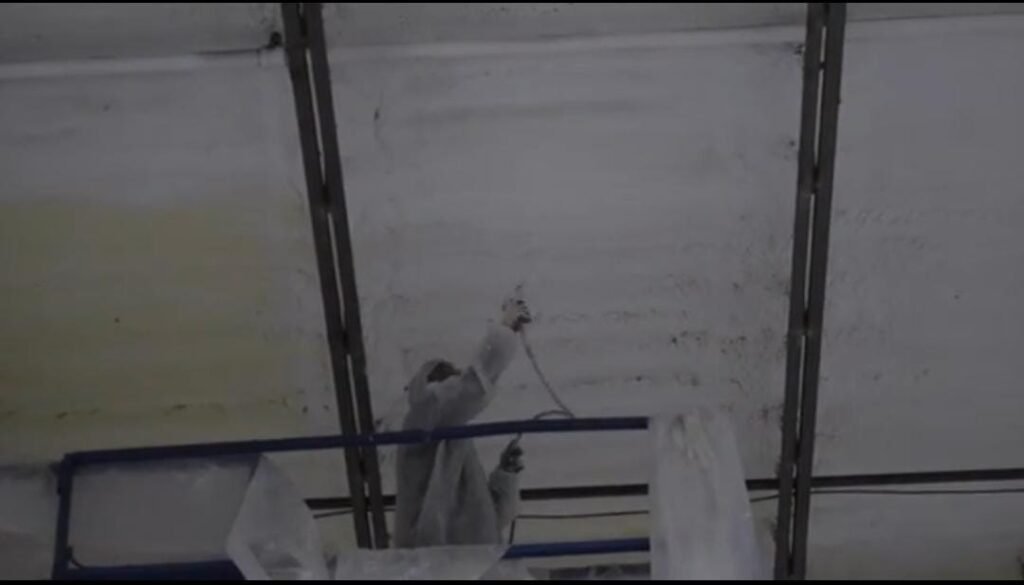Warehouse roof insulation is most important as garage insulation We read the information and type of insulation to the warehouse, in the previous post warehouse insulation. Now in this post, we discover information about warehouse roof insulation. warehouse ceiling insulation, warehouse wall insulation. In all these insulation methods, you may be confused as to which insulation to use, such as for walls, ceilings, or warehouse floors. Roof insulation in the warehouse is more important because you know we can lose energy through the roof of the warehouse.
Nowadays new trends become famous for constructing warehouses using metal material or metal framing because it’s easy to construct but the problem is that we may be lost energy via the metal roof, it’s become hot or cool very soon and make the humid inside environment a warehouse. That’s why we have to need to insulate the roof of the warehouse is very necessary.
So, if you have a warehouse or any other similar building or commercial workplace then you have to need to insulate its roof for the purpose of saving energy efficiency and achieving high comfort. For that, you need to, insulate the roof, walls, and ceiling of the warehouse. The following information will be helpful to you.

Warehouse Roof Insulation/ warehouse ceiling insulation
Following is the option of insulating the roof of the warehouse. By using this insulation material you can insulate the roof of the warehouse. These types of insulation are known as the best insulation for warehouses. You can select any one from them, according to your need and budget.
In places with severe temperatures, warehouse roof insulation is a vital component of building design and construction. A steady indoor temperature, lower energy expenses, and less condensation are all benefits of proper insulation. When it comes to warehouse roof insulation, keep the following points in mind:
Fibreglass, cellulose, foam, and reflective insulation are a few examples of the various types of insulation materials. Each style has advantages and disadvantages, and the ideal option relies on the particular requirements of the structure.
Things to consider while choosing warehouse roof insulation material
R-value: This describes how well insulation can fend against heat flow. The effectiveness of the insulation will increase as the R-value increases. Depending on the area and climate, different R-values for warehouse roof insulation are advised.
Installation: For insulation to be effective, installation must be done correctly. To avoid gaps and air leaks, insulation should be put evenly and tightly.
Moisture control: Moisture can reduce the efficiency of the insulation and promote the growth of mold. Vapor barriers and adequate ventilation can assist in avoiding moisture buildup.
Maintenance: Performing routine maintenance, such as checking for damage or gaps, will assist in guaranteeing that the insulation keeps working properly.
To choose the finest insulation alternatives for your warehouse roof, you must speak with a qualified contractor or insulation specialist. Now let’s see, the best insulation materials for insulating the warehouse roof or warehouse ceiling insulation.
Foil Insulation to warehouse roof insulation
Foil Insulation is the best insulation used to insulate the roof of the warehouse. Mostly foil can be used in combination with something else, such as fiberglass batts wrapped with foil. This foil insulation is typically and mostly installed under the roof deck of the warehouse, using this foil insulation will help to keep the environment cool and comfortable.

Foil insulation helps to roof reflect, rather than absorb heat from the sun. This insulation can help to keep the inside space cooler and more comfortable. An insulated warehouse roof with this foil insulation will help to reduce energy efficiency and energy bills as well as helps to maximize the energy efficiency of the warehouse. If you use this insulation material to insulate the roof of the warehouse then it will help to improve the performance of the warehouse HVAC system.
Spray foam insulation – warehouse ceiling insulation

One practical choice for insulating a warehouse roof is spray foam insulation. Due to its high R-value and resistance to moisture, closed-cell spray foam insulation is the ideal type for commercial and industrial applications. Spray foam insulation may be high in cost compared to other types of insulation, but if it is workable, using this product can save significant energy.
It’s necessary to choose a professional installer with experience in commercial insulation because a proper installation is essential to the efficiency of the insulation. At the time of insulating the roof of the warehouse with spray foam insulation, you need to be aware of safety precautions that should be taken, such as donning safety gear and adhering to safety regulations.
Although spray foam insulation requires little care, regular roof inspections are required to make sure it is operating properly.
Fiberglass Insulation – warehouse roof insulation

Fiberglass insulation is best for roof insulation in a warehouse. It can be sandwiched between two layers of foil; it is effective for providing heat insulation. Fiberglass Insulation is mostly installed below the roof deck, after using this you will able to achieve high comfort. This insulation can available either in a loose fill form or in a blanket form. You may know this type and method of insulation, which we shared information about it, in our previous post. Fiberglass insulation is mostly used to insulate any property because it has a better r value.
Radiant Barrier Insulation
A radiant Barrier is also one best option to insulate the roof of the warehouse. Because it consists of reflective material like foil. This insulation material can work as a barrier to radiant heat coming from the sun. and helps to keep cool to the warehouse. It helps to reflect heat back to space, that’s why many warehouse owners and contractors install warehouse roof insulation with Radiant Barrier because of its useful quality.
Steps to the installation of roof insulation roll
- Place the insulation roll over the horizontal beam along the length of a roof means purlins of the structural roof frame.
- Then nail the mesh or material like the net, and a wooden frame on the insulation sheet and attach it to the purlins.
- Tape the overlap of in sheet and nail discontinuously
- Then in the last steps, cover the finished exterior roof panel.
We recommended material to insulate the roof of the warehouse using foil insulation that is: Aluminium foil bubble / metalized bubble and the second one is, and Aluminium EPE Foam Insulation.

Benefits of roof insulation to warehouse
The following are a few benefits of warehouse roof insulation:
Electricity savings:
By keeping the structure warmer in the winter and cooler in the summer, insulating your warehouse roof can help you save money on electricity. After insulation, the roof of the warehouse, then confirms you’ll save a certain amount of money on heating and cooling your warehouse, and maintaining a comfortable inside environment of the warehouse, which over time might save you a lot of money.
Increased comfort:
Insulation can help keep the temperature and humidity level in your warehouse constant, making the space more comfortable for both employees and guests. Additionally, it can lessen the chance of mold formation and other moisture-related problems.
Increased toughness:
Insulation can guard your warehouse roof against moisture damage, which can cause rot, corrosion, and other structural issues. After insulating the roof of the warehouse you can increase the value of the warehouse’s roof. as well as make your roof last longer and strong then definitely you need to spend less money on repairs.
Noise reduction: benefits of roof insulation
Insulation to the roof of the warehouse can help to cut down on the amount of noise that came from outside of the warehouse and that enters or exits your warehouse, so it can help to make it a more comfortable and effective place to work.
Environmental advantages
Insulating your warehouse roof can lower your building’s carbon footprint by lowering the energy required to maintain a suitable temperature. You can achieve sustainability objectives and lessen your environmental effect by doing this.
Bottom Line of Warehouse Roof Insulation
If you want to insulate your warehouse, then this article of ours will be very important for you. Because in this post we have come up with more information about the roof the most important part of the warehouse, which can affect to disturb the inside environment of the warehouse and make it an unhealthier environment.
In this article, we have mentioned some roof insulation materials for warehouse roof insulation or warehouse ceiling insulation. Out of all the insulation types, we recommended the use of foil insulation is considered to be an easy as well as effective option for insulating the walls of the warehouse. Bubble and radiant barrier insulation is also the best choice you can go with anyone from them.
Spray Foam insulation is considered to be the best to insulate the warehouse. If you are considering Spray foam, we suggest you select the Closed Spray Insulation. You must read it.
What is the best insulation for a warehouse roof?
There are a number of things to take into account while insulating a warehouse roof, including the environment, financial constraints, and the space’s unique needs. The following three types of insulation for warehouse roofs are frequently used:
Spray foam insulation
Due to its superior thermal performance and air-sealing abilities, spray foam insulation is a preferred material for warehouse roofs. It is applied as a liquid, then it expands to become solid foam, creating a layer of insulation that is smooth and continuous. By effectively forming an air barrier, spray foam insulation can cut down on heat loss and stop air leaks. Additionally, it provides exceptional resistance to dampness and can aid with soundproofing.
Insulated Metal Panels (IMPs):
Insulated metal panels are made of two metal panels and a foam core. They are a useful solution for warehouse roofs since they offer both insulation and structural support. IMPs may be installed quickly and easily, have strong thermal resistance, and prevent thermal bridging. They offer a strong and long-lasting solution and come in a range of thicknesses.
Reflective insulation
Reflective insulation is used to deflect radiant heat away from the warehouse roof. It is sometimes referred to as radiant barrier insulation. It usually consists of a foil material that is put facing the roof and is reflective. Reflective insulation works especially well in hot regions since it helps to cut down on heat gain and cooling expenses. It is a reasonable choice that can be used in conjunction with other
Why insulate a warehouse?

A warehouse’s insulation is a wise investment because it has so many advantages. Here are some significant arguments in favor of warehouse insulation:
To Improved Insulation:
Insulation is a key factor in increasing energy efficiency. A warehouse may greatly reduce heat transfer by adequately insulating its walls, roof, and doors, limiting unwelcome heat gain in the summer and heat loss in the winter. The need for excessive heating or cooling is decreased by maintaining a consistent and comfortable home temperature thanks to this.
Soundproofing:
Insulation materials with sound-dampening properties can effectively reduce noise transmission within the warehouse. This is particularly beneficial in industrial environments where machinery, equipment, and loading/unloading activities generate high noise levels. Soundproofing insulation creates a quieter and more productive workspace, enhancing employee well-being and concentration.
Condensation Prevention:
In regions with high humidity or temperature differentials, insulation helps prevent condensation. Condensation can lead to moisture-related issues such as mold growth, rotting, and damage to goods and infrastructure. By providing a thermal barrier, insulation reduces the likelihood of condensation formation, preserving the integrity of the warehouse and its contents.
For achieving all these things, you need to insulate your warehouse. That’s why you need to insulate Warehouse.
Do let us know how you feel about this information by commenting.
Like our Facebook page and follow for other updates like this.
